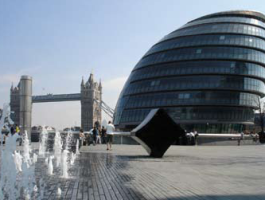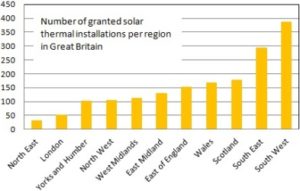Great Britain: Launch of the UK Renewable Heat Incentive
December 5, 2011
After considerable delays and uncertainty, the UK’s Department for Energy and Climate Change (DECC) has been finally launched the Renewable Heat Incentive (RHI) scheme on 28th November 2011. Solar heating is one of the included technologies. The first phase of the tariff support is targeted at the non-domestic sector. This includes businesses, public sector, charities, not-for-profit organisations or industry which contributes 38% of the UK’s carbon emissions. Installations that were previously completed after 15 July 2009 will be eligible.
The supported technologies include solar thermal, solid and gaseous biomass, ground and water source heat-pumps, on-site biogas, deep geothermal, renewable CHP, energy from waste and injection of bio-methane into the grid. The site locations must be in England, Scotland and Wales. The second phase of the RHI scheme later in 2012 will see expansion to include more technologies as well as support for households.
The tariff for solar thermal is set at Pound Sterling (GBP) 0.085 (EUR 0.09) per generated kWh for 20 years. A heat meter is required to validate the heat production. Collector array sizes of up to 200 kW are currently supported. The conversion of power to area has not yet been made clear although most would expect the value of the European Solar Thermal Industry Federation (ESTIF) of 0.7 kWth/m² to be valid. The RHI is being administered by Ofgem E-Serve, the office of the gas and electricity markets, who is responsible for paying the tariff to the owner of the solar thermal system. GBP 860 million has been made available from central Government funding to support the RHI over the period 2011 to 2015.
Only solar thermal installations comprising liquid filled flat plate or evacuated tube solar collectors will be eligible for the RHI. For solar thermal systems below 45 kWth the installer is required to be registered under the Microgeneration Certification Scheme (MCS) who then must follow the MIS 3001 technical guidelines. Also the solar collector must be either Solar Keymark or otherwise listed on the MCS Website. For between 45 kW and 200 kW, the technical requirements are not fully detailed. Other types of solar thermal technologies, such as air collectors, solar thermal parabolic and trough collectors are not eligible. Hybrid solar photovoltaic-thermal (PVT) systems will be eligible in respect of their heat output only.
The application of the heat must be inside a permanent, long-lasting building and can include an internal swimming pool, space heating or process heat. It also includes heat that is subsequently used for cooling, e.g. passing renewable heat through absorption chillers. It does not include heat used for the generation of electricity. Any heat that is rejected from a system for example through a heat dissipation circuit of a solar thermal system, is not eligible for RHI support and must not be included in meter readings. Only liquid (water with additives) or steam must be initially heated by the solar collector to transport heat.
The heat meters for the RHI will be required to meet the Class 2 accuracy requirements set out in Annex I to the European Measuring Instruments Directive (MID) (2004/22/EC). This means all heat meters used for RHI purposes must comprise of the following:
- A flow meter which determines the volume of fluid which has passed through a pipe within a given time period
- A matched pair of temperature sensors that are calibrated together as a pair
- Calculator/digital integrator which uses the information provided by the flow meter and the matched pair of temperature sensors to calculate the heat energy being transferred.
For the UK solar industry, there is currently a shortage of suitable meters for glycol filled circuits.
More information:
RHI website


